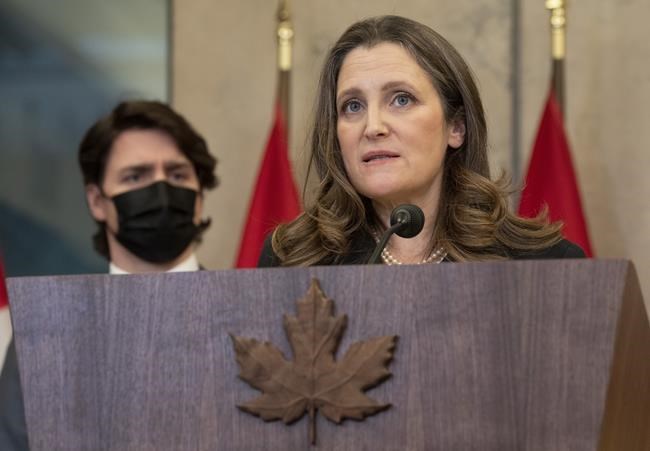TORONTO — The federal government's move to use expanded financial powers to crack down on the trucker protests is being called a severe overreach by financial crime experts, while details remain scarce on how some of the directives will be implemented.
Finance Minister Chrystia Freeland announced Monday that crowdfunding platforms will now fall under anti-money laundering reporting requirements and financial institutions are being asked to freeze account services to both individual and business clients who they suspect are aiding the blockades.
Freeland said the actions, brought in through the Emergency Act, were necessary to end the illegal blockades that are causing serious harm to the economy as well as threatening democratic institutions and Canada’s international standing.
She said it was important to follow the money to help put an end to the blockades, and that trucks that remain at the protests will have their insurance suspended, and corporate accounts will be frozen.
Flagging financial accounts under the legislation could, however, financially ruin those targeted and make it difficult for them to get financial services in the future, said Kim Manchester, managing director of financial intelligence training company ManchesterCF.
"It's very tough on people when the activities of the Canadian government can lead to the financial meltdown of individuals associated with the protests who are guilty by association, by directive, and not by judicial process."
He noted that the legislative framework around the laws was crafted to target terrorists and transnational organized crime, so when individuals are flagged under the system, banks and other financial institutions may be reluctant to deal with related accounts flagged as high risk.
"Any financial institution who becomes aware of, or is informed to them by government, may be incredibly leery about dealing with that individual."
Invoking the Emergency Act is entirely out of proportion to the threats posed by the protesters and should be reserved for severe emergencies or when national security is compromised, said Manchester.
Vanessa Iafolla, a financial crime consultant, said the use of the act was a "serious derivation from the normal democratic processes that we generally expect to see in Canadian society" and that the government could have gone about changing the rules without undertaking emergency powers.
"I have real concerns about the precedent that this sets for future protests in Canada."
She said that while accounts won't necessarily be shut down overnight, banks will have the option to eliminate from the market anyone involved in the protests.
Iafolla said that it will be up to the banks to decide on their individual risk tolerance, but that on the money services business at least, which helps underpin crowdfunding sites, Canadian financial institutions have been fairly risk averse.
Banks have so far declined to comment on the announcement, while Intact Insurance spokeswoman Kate Moseley-Williams said the company was carefully reviewing the announcement and awaiting further details.
The Insurance Bureau of Canada said in a statement that it recognizes the negative impacts of the illegal blockades, and said that the association and its members will work with the federal government to determine how best to implement the proclamation.
How banks and other financial institutions decide which individuals and businesses to target is a key question yet to be answered, said Matt McGuire, a forensic accountant and practice leader at the AML Shop.
He said that while there's potential for abuse of the powers and that the lack of appeals process is concerning, the actions will also likely be helpful in ending the blockades.
"I think this is as close to as effective as they could get."
The strategy of targeting individuals may get around the problem of new crowdfunding options popping up to replace ones that get cut off, he said.
The Ontario government, for example, successfully petitioned an Ontario court to freeze funds raised through GiveSendGo, though the Christian fundraising platform says it is still looking for ways to continue fund flows.
Protesters are also looking to cryptocurrency to raise funds, including a Freedom Convoy Token that has emerged.
The expanded rules around crowdfunding sites also include cryptocurrencies, with the platforms now expected to report to the Financial Transactions and Reports Analysis Centre of Canada.
The expansion of Fintrac will increase disclosures around fundraising platforms, while numerous entities are already required to report to the financial intelligence unit including chartered banks, credit unions, insurers and securities dealers.
This report by The Canadian Press was first published Feb. 15, 2022.
Ian Bickis, The Canadian Press

